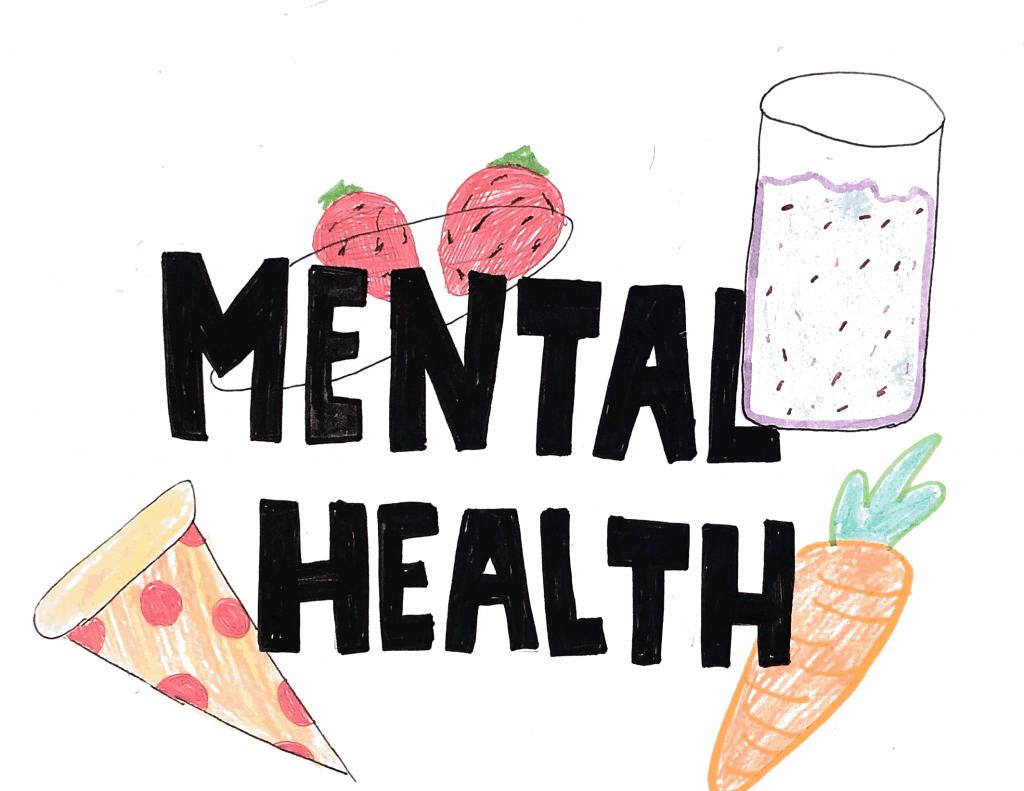Many students understand that the food we eat affects our physical health, our body’s appearance, and our fitness level. At the same time, many are uninformed that food also affects our mental health regarding our brain, our psychological health, and our social well-being. The brain is a highly metabolic organ that needs high-quality energy to function efficiently, just like the heart needs good quality nutrients to pump blood properly. During these uncertain times, we must manage both our physical and mental health. Having stable mental health encourages the maintenance of good relationships with others, improves our ability to cope with life’s challenges, and allows us to handle everyday stress. Mental health is arguably one of the most important aspects of daily life, so a simple way to maintain good mental health is by eating healthy. Of course, this is easier said than done, especially when confined to our homes.
High school students are busy with schoolwork, sports, and extracurricular activities. Time is limited and many students settle for a quick, unhealthy meal or snack in between activities due to convenience. On top of that, stress plays a big role in our food choices. The moments of relief after a big test are quickly overshadowed by the thoughts of more work, often leading to anxiety. Students experiencing this mental strain may turn to food as a way of coping with their negative emotions. Many are inclined to choose foods that are not nutritious but rather addictive and high in sugar to satisfy a craving. Nobody would rather eat celery over cookies! As freshman track and field runner Brian Brady shared: “I like to eat junk and sugary foods because it makes me feel happier which makes me more sociable.”
But you may want to hold off before you have another chocolate bar. While it is difficult to live with anxiety, coping with stress by eating high fat and sugary foods only lead to a cycle of negative psychological consequences. Few people understand that eating these foods increase the risk of cognitive decline throughout the day. Cognitive decline can include brain fogs, confusion, impaired judgment, and loss of memory. If you have experienced brain fogs, a fuzzy memory, or the inability to think clearly during a test, consider what you digested hours before. Perhaps it was the morning PopTart or the pancakes with extra maple syrup that now makes it difficult to recall the materials you studied at length the night before. Not only will a poor diet affect people in a matter of hours or days, but it can affect individuals in the long run as well. Keep in mind that it is completely reasonable to eat chicken fingers and fries once in a while, but not every day. Eating these foods without moderation will perniciously increase your risk for mental disorders and diseases. Many experiments have shown that people with the healthiest diets were 24-percent less likely to have cognitive decline than those with the unhealthiest diets. Additionally, research shows that a diet consisting primarily of high fat and high sugar foods significantly increases one’s risk of developing depression.
A diet that promotes good mental health consists of fluids, macronutrients, micronutrients, and adequate calories. It incorporates a variety of foods that includes many essential vitamins and minerals. To give an example, selenium is a mineral in many food options, including seeds and nuts, that help prevent brain fogs. The famous surgeon, educator, and author Dr. Mehmet Öz said, “I love nuts. I eat them all the time, they are easy to carry around, and I am never hungry all day long.” In addition, vitamin C, found in broccoli and strawberries, helps reduce stress hormone levels, and vitamin D, found in milk and eggs, helps to raise serotonin in our bodies. Not only is Serotonin one of the main neurotransmitters in the brain and the digestive system, but it also improves your mood and keeps you happy. There are plenty of other foods high in these nutrients that may be more appealing to implement into your regular diet.
Here are some other realistic steps high school students can take to improve nutrition and mental health. Once school resumes, try to make your lunch at home, since food from home will frequently be healthier than food from school. If you must eat at school, choose your meal wisely. Luckily, our cafeteria offers many nutrition-conscious options and prioritizes healthy choices. Choose less refined sugars, eat more whole grains, and try to include protein at each meal. Proteins are made up of amino acids, which make up the chemicals your brain needs to regulate your thoughts and feelings. It also keeps you feeling satisfied for a longer time. Also, make sure to drink plenty of water; you should drink two liters of water every day which equates to approximately four 16 oz Poland Spring bottles of water. Even mild dehydration can cause difficulty concentrating and lead to mood changes. Keep multiple bottles with you during the school day and especially during late-night study sessions. Lastly, eat breakfast with lots of fiber and nutrients that include lean protein, good fats, and whole-grain carbohydrates. Studies have found that skipping breakfast or eating a low-quality breakfast harms cognitive function, and leads to slow response and reduced attention. Remember, a healthy diet can improve your mental health and prevent mental health disorders such as depression and anxiety. Take advantage of the extra time afforded during the coronavirus quarantine to protect and boost your mental health. You will thank yourself when you are older for choosing to eat healthily now!
Brandon Shintani
staff writer
Graphic: Sofia Lee

